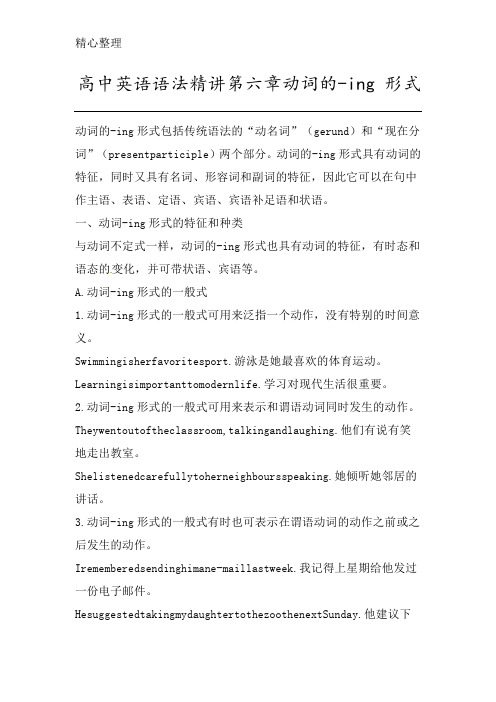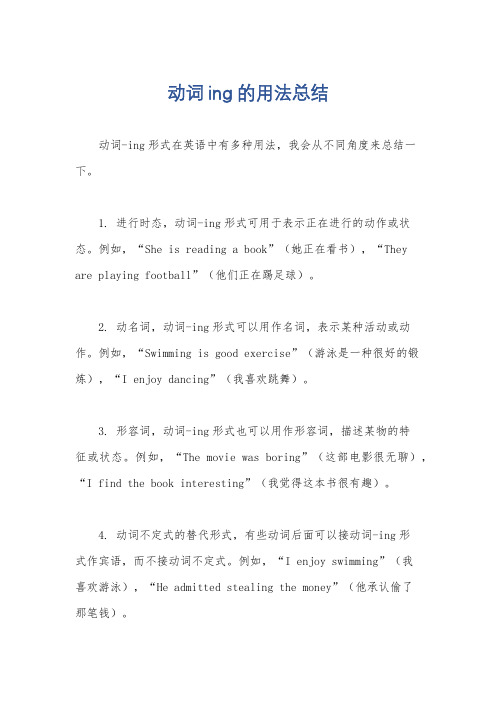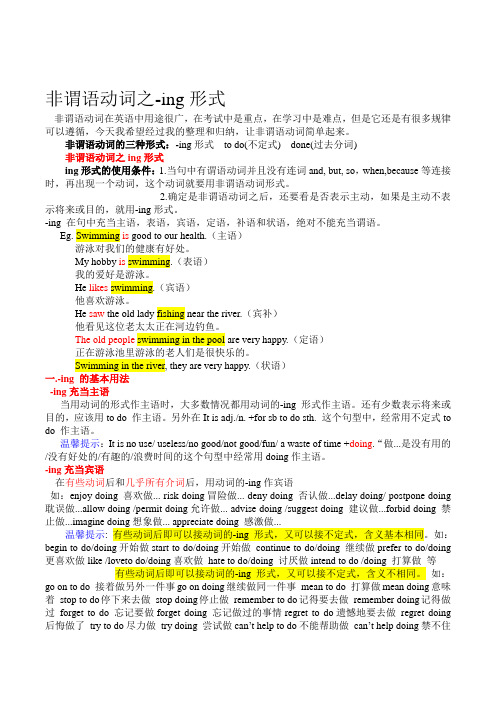高中英语语法(6)-动词的ing形式
高考英语语法:动词的-ing形式的逻辑主语

高考英语语法:动词的-ing形式的逻辑主语A:作主语的-ing形式-ing形式作主语时,其逻辑主语对于谈话双方是不言而喻的。
Reading aloud is very helpful.朗读是很有好处的。
(Reading aloud 的逻辑主语是泛指任何人,因而无需表达出来)提示:如果作主语的-ing形式需要自己的逻辑主语时,一般用物主代词或名词所有格(即名词后加’s)。
His father’s falling ill worri ed him greatly.他父亲生病使他很着急。
(his father是falling ill的逻辑主语)Your coming to work with us will be a great encouragement to us.你来和我们一道工作,对我们是很大的鼓舞。
(you是coming to work with us的逻辑主语)B:作表语的-ing形式-ing形式作表语时,其逻辑主语往往是句子中的主语,但作表语的-ing形式也可带有自己的逻辑主语。
What worries me most is Julia’s staying too late every night.我担心的是她天天晚上熬夜熬得太迟。
(staying too late every night的逻辑主语是Julia)The main problem is your not having practiced a lot.主要的问题是你缺乏大量的练习。
(not having practiced a lot的逻辑主语是you)C:作定语的-ing形式-ing形式作定语时,其逻辑主语就是它修饰的名词。
an interesting book一本有意思的书= a book that interests its readersa running stream一条奔流的小溪= a stream that is running如果-ing形式的逻辑主语是动作的承受者,就要用-ing形式的被动式。
2022高中英语语法精炼-第六章动词的-ing形式

2022高中英语语法精炼-第六章动词的-ing形式二、动词的-ing形式的用法A.动词的-ing形式作主语1.动词的-ing形式可直截了当置于句首作主语。
Seeing is believing.百闻不如一见。
Collecting stamps is interesting.集邮专门有味。
Learning about a language is easier than using it.学习有关语言的知识比使用语言容易。
Being invited to the party was a great honor to the family.被邀请参加晚会是这家人的荣耀。
2.为了保持句子平稳,通常用先行词it作形式主语,而把真正的主语放在句末。
It is easy making plans, but it is difficult carrying them.制定打算专门容易,实行它却专门难。
It is no use crying over spilt milk. 作无益的后悔是没有用的。
It's a waste of time arguing about it. 争辩这事是白费时刻。
必背:动词的-ing形式作主语的几个常用句型。
It's no good talking to him. 和他谈话是没有用的。
It is useless telephoning him. He is not willing to come.给他打没用。
他不情愿来。
It's worth making an effort. 努力一下是值得的。
There is no saying when it will stop raining. 无法确信这场雨什么时候会停。
There is no joking about such matters. 这种事开不得玩笑。
B.动词的-ing形式作表语动词的-ing形式作表语的有两种不同的含义:1.表示主语的内容是什么。
重点高中英语语法精讲动词的-ing形式

高中英语语法精讲第六章动词的-ing形式动词的-ing形式包括传统语法的“动名词”(gerund)和“现在分词”(presentparticiple)两个部分。
动词的-ing形式具有动词的特征,同时又具有名词、形容词和副词的特征,因此它可以在句中语态的变化,并可带状语、宾语等。
3.动词-ing形式的一般式有时也可表示在谓语动词的动作之前或之后发生的动作。
Irememberedsendinghimane-maillastweek.我记得上星期给他发过一份电子邮件。
HesuggestedtakingmydaughtertothezoothenextSunday.他建议下个星期天带我女儿去动物园。
B.动词-ing形式的完成式动词的-ing形式的完成式表示一个已完成的动作,这个动作发生或完成在谓语动词表示的动作之前。
Havinglivedinthiscityforthreeyears,sheknowsitverywell.在这个城市生活了3年,她对这里已很熟悉。
重要。
Ican'tstandbeingkeptwaiting.我不堪久候。
2.完成式的被动形式Iheardofhishavingbeenchosentobethecoachoftheteam.我听说他被选为球队的教练。
Havingbeenshownthelab,weweretakentoseetheschoollibrary.在被带去看了实验室之后,我们又被带去参观校图书馆。
D.动词-ing形式的否定形式动词的-ing形式的否定形式是由not加动词的-ing形式构成。
Hisnotcomingmadeeveryonepresentverydisappointed.他没来使在场的每个人都很失望。
晚会是这家人的荣耀。
2.为了保持句子平衡,通常用先行词it作形式主语,而把真正的主语放在句末。
Itiseasymakingplans,butitisdifficultcarryingthem.制定计划很容易,实行它却很难。
(完整版)高中英语语法——动词ing形式的用法

3. 在介词后接动名词作宾语
1) I insist on taking proper food for this trip. 2) Instead of smiling, each of them made a face. 3) She was very interested in working for our company.
1)Walking is a good form of exercise for both
young and old. 2)Watching news on TV has become a routine
for me. 3)Going to Hangzhou by train takes about
没有比……更糟的 • There is/was no point doing 做……无意义
Try to tell the meaning of each sentence.
1)There is no hiding of evil but not to do it. 若要人不知, 除非己莫为。 2)There is no joking about such matter. 这种事开不得玩笑。 3)There was no knowing when he would leave. 无法知道他什么时候离开。
归纳: 常用-ing形式作主语的句型有: • It +be +a waste of time doing • It is/was no good/use doing • It is/was hardly/scarcely worth doing • It is/was worth/worthwhile doing • There is no doing...无法……; 不允许……
动词ing的用法总结

动词ing的用法总结动词-ing形式在英语中有多种用法,我会从不同角度来总结一下。
1. 进行时态,动词-ing形式可用于表示正在进行的动作或状态。
例如,“She is reading a book”(她正在看书),“They are playing football”(他们正在踢足球)。
2. 动名词,动词-ing形式可以用作名词,表示某种活动或动作。
例如,“Swimming is good exercise”(游泳是一种很好的锻炼),“I enjoy dancing”(我喜欢跳舞)。
3. 形容词,动词-ing形式也可以用作形容词,描述某物的特征或状态。
例如,“The movie was boring”(这部电影很无聊),“I find the book interesting”(我觉得这本书很有趣)。
4. 动词不定式的替代形式,有些动词后面可以接动词-ing形式作宾语,而不接动词不定式。
例如,“I enjoy swimming”(我喜欢游泳),“He admitted stealing the money”(他承认偷了那笔钱)。
5. 表示原因或条件,动词-ing形式可以用来表示原因或条件。
例如,“Being tired, she went to bed early”(因为累了,她早早就上床睡觉了),“Without studying, you won't pass the exam”(不学习的话,你就通不过考试)。
总的来说,动词-ing形式在英语中有多种用法,包括进行时态、动名词、形容词、动词不定式的替代形式以及表示原因或条件等。
掌握这些用法可以帮助我们更准确地理解和运用动词-ing形式。
高考英语重点语法非谓语动词之-ing形式

非谓语动词之-ing形式非谓语动词在英语中用途很广,在考试中是重点,在学习中是难点,但是它还是有很多规律可以遵循,今天我希望经过我的整理和归纳,让非谓语动词简单起来。
非谓语动词的三种形式:-ing形式to do(不定式) done(过去分词)非谓语动词之ing形式ing形式的使用条件:1.当句中有谓语动词并且没有连词and, but, so,when,because等连接时,再出现一个动词,这个动词就要用非谓语动词形式。
2.确定是非谓语动词之后,还要看是否表示主动,如果是主动不表示将来或目的,就用-ing形式。
-ing 在句中充当主语,表语,宾语,定语,补语和状语,绝对不能充当谓语。
Eg. Swimming is good to our health.(主语)游泳对我们的健康有好处。
My hobby is swimming.(表语)我的爱好是游泳。
He likes swimming.(宾语)他喜欢游泳。
He saw the old lady fishing near the river.(宾补)他看见这位老太太正在河边钓鱼。
The old people swimming in the pool are very happy.(定语)正在游泳池里游泳的老人们是很快乐的。
Swimming in the river, they are very happy.(状语)一.-ing 的基本用法-ing充当主语当用动词的形式作主语时,大多数情况都用动词的-ing 形式作主语。
还有少数表示将来或目的,应该用to do 作主语。
另外在It is adj./n. +for sb to do sth. 这个句型中,经常用不定式to do 作主语。
温馨提示:It is no use/ useless/no good/not good/fun/ a waste of time +doing.“做...是没有用的/没有好处的/有趣的/浪费时间的这个句型中经常用doing作主语。
高中英语 高考冲刺语法专题6:非谓语动词-ing(教师版)
解题方法:先看选项,AC是谓语BD是非谓语
第二个题目是并列句,所以前后是两个句子,and之前的句子缺的就是谓语动词,又由had决定了是过去时,所以用was
第一道题目,前后两部分之间用逗号分开,所以不是并列句,所以前一部分是后一部分的状语,也就不是句子,所以选非谓语,用being
2.The girl ______ in a red coat is Mary.
观察下列从reading中选取的句子,注意分析V-ing形式作的句子成分。
1.Since then,finding waysto grow more rice has been his life goal.
2.However, he doesn’t care aboutbeing famous.
3.He enjoyslistening to violin music, playing mahjong, swimming and reading.
suggest建议resist抵制dislike不喜欢fancy设想;想象
2.接动名词作宾语的短语:
put off推迟insist on坚持feel like想要depend /rely on依靠
object to反对lead to导致succeed in成功做……be worth值得
devote...to...献身于…… look forward to期盼owing to归因于give up放弃
4.Justdreamingfor things, however, costs nothing.
自我总结:1,4划线部分作主语; 2,3划线部分作宾语;
概述:动词-ing形式具有名词性质,可在句中担任主语,宾语,表语,定语,宾补和状语,但不能单独作谓语。
高中英语语法《动词的-ing形式》专题教案
高中英语语法《动词的-ing形式》专题教案动词的-ing形式包括传统语法的“动名词”(gerund和“现在分词”(present participle两个部分。
动词的-ing形式具有动词的特征,同时又具有名词、形容词和副词的特征,因此它可以在句中作主语、表语、定语、宾语、宾语补足语和状语。
一、动词-ing形式的特征和种类与动词不定式一样,动词的-ing形式也具有动词的特征,有时态和语态的变化,并可带状语、宾语等。
A.动词-ing形式的一般式1.动词-ing形式的一般式可用来泛指一个动作,没有特别的时间意义。
Swimming is her fa vorite sport.游泳是她最喜欢的体育运动。
Learning is important to modern life.学习对现代生活很重要。
2.动词-ing形式的一般式可用来表示和谓语动词同时发生的动作。
They went out of the classroom,talking and laughing.他们有说有笑地走出教室。
She listened carefully to her neighbours speaking.她倾听她邻居的讲话。
3.动词-ing形式的一般式有时也可表示在谓语动词的动作之前或之后发生的动作。
I remembered sending him an e-mail last week.我记得上星期给他发过一份电子邮件。
He suggested taking my daughter to the zoo the next Sunday.他建议下个星期天带我女儿去动物园。
B.动词-ing形式的完成式动词的-ing形式的完成式表示一个已完成的动作,这个动作发生或完成在谓语动词表示的动作之前。
Having lived in this city for three years,she knows it very well.在这个城市生活了3年,她对这里已很熟悉。
动词的ing形式
动词的-ing形式用法讲解Forgive me for my having been troubling you.原谅我打扰了你。
(2)动词的-ing形式的语态动词的-ing形式有主动和被动两种形式,主动式通常表示它的逻辑主语是其动作的执行者;被动式通常表示逻辑主语是动作的承受者时。
①主动语态Walking in the street yesterday afternoon, he came across Mr. Smith.昨天他在大街上散步时遇到了史密斯先生。
His often coming late made his boss very angry.他经常迟到使他的老板很恼火。
②被动语态动词的-ing形式的被动语态分为一般式和完成式两种。
一般式(being d one)表示一个被动动作正在进行,或与谓语动词的动作同时发生;完成式(having been done)表示一个被动动作发生在谓语动词的动作之前。
He has always insisted on his being called Dr. Turner instead of Mr. Turner.他坚持让人家叫他特纳博士而不是特纳先生。
Do you mind Jam’s being left alone at home? 让詹姆自己在家你介意吗?While shopping, people sometimes can't help being persuaded into buying something theydon't really need.买东西时,人们有时情不自禁的被说服买一些他们确实不需要的东西。
I noticed the boy being beaten by his m other.我注意到那男孩挨他母亲的打。
Having been cheated many times, she now believes in nobody. 由于多次受骗,所以她现在对任何人都不信任。
英语语法动词-ing
• 注:下面几种情况多用不定式作宾语: • a. 当start, begin本身用于进行时态时。 • When the teacher came into the room, he was starting to write to his parents. • b. 当start, begin后接表示心理活动的动词时。 • Hearing the news, he started to think of a good way to solve the problem. • c. 当句子的主语是无生命的东西时。 • We were about to leave when it began to rain.
6) 动词-ing作补语:
• ①动词-ing可以在see, hear, notice, watch, feel, look at, listen to, observe, have, get, leave, keep, set, catch, find等动词后面和一个名词或代 词构成一个复合宾语,作宾语补语。如: • I noticed a man running out of the bank when I got off the car. • Last night the shopkeeper caught a child stealing some food in the shop. • ②上面这类句子也可变成被动语态,这时,动词 -ing可看成是主语补语。如: • We were kept waiting for quite a long time. • Lily was never heard singing that song again.
• 5. 有些动词既能接不定式,又能接动词-ing, 含义有所不同。如: • ①forget, remember, regret等如: • Do you remember seeing me before? 你记 得以前见过我吗? • Remember to lock the door when you leave. 离开时要记得锁门。
- 1、下载文档前请自行甄别文档内容的完整性,平台不提供额外的编辑、内容补充、找答案等附加服务。
- 2、"仅部分预览"的文档,不可在线预览部分如存在完整性等问题,可反馈申请退款(可完整预览的文档不适用该条件!)。
- 3、如文档侵犯您的权益,请联系客服反馈,我们会尽快为您处理(人工客服工作时间:9:00-18:30)。
第6章动词的-ing形式动词的-ing形式包括传统语法的“动名词”(gerund)和“现在分词”(present participle)两个部分。
动词的-ing形式具有动词的特征,同时又具有名词、形容词和副词的特征,因此它可以在句中作主语、表语、定语、宾语、宾语补足语和状语。
一、动词-ing形式的特征和种类与动词不定式一样,动词的-ing形式也具有动词的特征,有时态和语态的变化,并可带状语、宾语等。
A.动词-ing形式的一般式1. 动词-ing形式的一般式可用来泛指一个动作,没有特别的时间意义。
Swimming is her favorite sport. 游泳是她最喜欢的体育运动。
Learning is important to modern life. 学习对现代生活很重要。
2. 动词-ing形式的一般式可用来表示和谓语动词同时发生的动作。
They went out of the classroom, talking and laughing. 他们有说有笑地走出教室。
She listened carefully to her neighbours speaking. 她倾听她邻居的讲话。
3. 动词-ing形式的一般式有时也可表示在谓语动词的动作之前或之后发生的动作。
I remembered sending him an e-mail last week. 我记得上星期给他发过一份电子邮件。
He suggested taking my daughter to the zoo the next Sunday. 他建议下个星期天带我女儿去动物园。
B. 动词-ing形式的完成式动词的-ing形式的完成式表示一个已完成的动作,这个动作发生或完成在谓语动词表示的动作之前。
Having lived in this city for three years, she knows it very well. 在这个城市生活了3年,她对这里已很熟悉。
I really regretted having missed such an exciting lecture. 错过了这么振奋人心的演讲,我真的很遗憾。
注意:在现代英语中,作宾语的-ing形式的完成式可用一般式来代替。
I really regretted missing such an exciting lecture. 错过了这么振奋人心的演讲,我真的很遗憾。
(=I really regretted having missed such an exciting lecture.)We remembered seeing the film. 我们记得看过这部电影。
(=We remembered having seen the film. )C. 动词-ing形式的被动形式动词的-ing形式的被动形式表示它的逻辑主语是-ing形式表示的动作的承受者。
1.一般式的被动形式The question being discussed is very important. 正在讨论的问题很重要。
I can't stand being kept waiting. 我不堪久候。
2.完成式的被动形式I heard of his having been chosen to be the coach of the team. 我听说他被选为球队的教练。
Having been shown the lab, we were taken to see the school library.在被带去看了实验室之后,我们又被带去参观校图书馆。
D. 动词-ing形式的否定形式动词的-ing形式的否定形式是由not 加动词的-ing形式构成。
His not coming made everyone present very disappointed. 他没来使在场的每个人都很失望。
I'm sorry for not being present at the meeting in time. 我很抱歉没能按时赴会。
Not knowing his address, I could do nothing but stay at home and wait. 不知道他的地址,我只好在家里等着。
Not having studied his lessons very hard, he failed the examinations. 因为没有努力学习功课,他考试不及格。
二、动词的-ing形式的用法A.动词的-ing形式作主语1.动词的-ing形式可直接置于句首作主语。
Seeing is believing. 百闻不如一见。
Collecting stamps is interesting. 集邮很有趣。
Learning about a language is easier than using it. 学习有关语言的知识比使用语言容易。
Being invited to the party was a great honor to the family. 被邀请参加晚会是这家人的荣耀。
2.为了保持句子平衡,通常用先行词it作形式主语,而把真正的主语放在句末。
It is easy making plans, but it is difficult carrying them. 制定计划很容易,实行它却很难。
It is no use crying over spilt milk. 作无益的后悔是没有用的。
It's a waste of time arguing about it. 争论这事是浪费时间。
必背:动词的-ing形式作主语的几个常用句型。
It's no good talking to him. 和他谈话是没有用的。
It is useless telephoning him. He is not willing to come. 给他打电话没用。
他不愿意来。
It's worth making an effort. 努力一下是值得的。
There is no saying when it will stop raining. 无法断定这场雨什么时候会停。
There is no joking about such matters. 这种事开不得玩笑。
B.动词的-ing形式作表语动词的-ing形式作表语的有两种不同的含义:1.表示主语的内容是什么。
Her job is keeping the lecture hall as clean as possible. 她的工作是尽量使报告厅保持干净。
The real question is getting to know the needs of the students. 真正的问题是了解学生的需要。
His hobby is collecting stamps. 他的爱好是集邮。
2.表示主语具有的特征。
The problem is quite puzzling. 这个问题很令人困惑。
It was astonishing to see the animals and plants that are found nowhere else in the world. 看到了世界上其它地方找不到的动植物真是令人惊讶。
The food at the dinner party did not seem very inviting. 宴会上的食物似乎并不诱人。
比较:一般说来,动词的-ing形式表示一般性、习惯性的动作,或抽象性的动作,时间概念不强。
而动词不定式表示的动作往往是具体的或一次性的动作,特别是将来的动作。
Smoking is forbidden here. 这里禁止吸烟。
(泛指)It's not good for you to smoke so much. 吸这么多烟对你的身体不好。
(具体)They prefer staying indoors when the weather is cold. 天冷时他们喜欢呆在室内。
(泛指)Would you prefer to stay at home this evening 今晚你想待在家里吗?(具体C.动词的-ing形式作宾语动词的-ing形式既可作及物动词的宾语,也可作介词的宾语。
1.作动词的宾语能用-ing形式作宾语的及物动词可分两类,一类是只能用-ing形式作宾语,另一类是既可用-ing形式作宾语,也可用不定式作宾语。
①只能用-ing形式作宾语的动词这类动词只能用-ing形式作宾语,不能用不定式作宾语。
Fancy meeting you here! 想不到在这儿见到你了!I suggest doing it in a different way. 我建议用另一种方法做这件事。
They didn't mind being treated like guests. 他们不在乎被人当作宾客对待。
They admitted smokinghaving smoked in the hall. 他们承认在大厅里抽过烟。
I regret sayinghaving said what I said. 我很后悔自己说过的话。
He couldn't help laughing. 他情不自禁地笑了起来。
I can't imagine the boy speaking so rudely to you. 我不能想像这个男孩对你说话这么没礼貌。
必背:只接动词的-ing形式而不接不定式作宾语的动词有admit 承认appreciate 感激avoid 避免consider 考虑delay 耽搁dislike 嫌恶enjoy 喜欢escape 避免excuse 原谅fancy 想不到feel like 意欲finish 完成forgive 原谅give up 放弃cannot help 情不自禁imagine 设想include 包括keep 保持mention 提及mind 介意miss 逃过put off 推迟practice 练习resist 抵制risk 冒险②既可用动词-ing形式作宾语,也可用不定式作宾语这类动词虽然既能用-ing形式作宾语,也能用不定式作宾语,但用法并不相同,主要有以下几种情况:a. 有些动词,如attempt, continue, hate, intend, like, love, prefer等,后面接动词的-ing形式或不定式区别不是很大。
They prefer spending to spend their summer vacation in Dalian. 他们更喜欢在大连度暑假。
